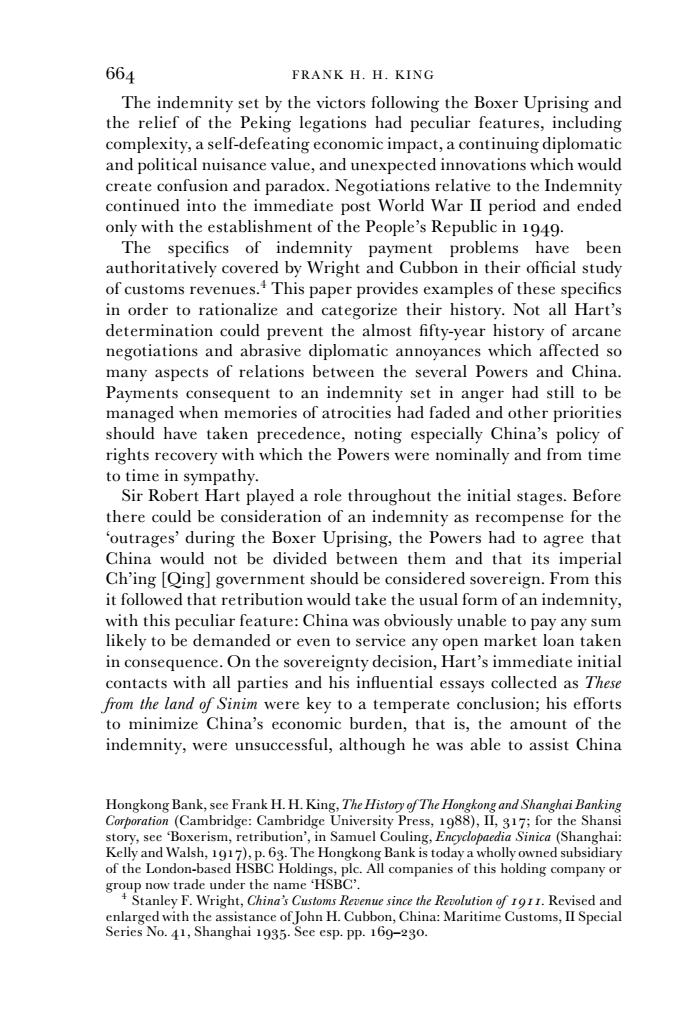正在加载图片...

664 FRANK H.H.KING The indemnity set by the victors following the Boxer Uprising and the relief of the Peking legations had peculiar features,including complexity,a self-defeating economic impact,a continuing diplomatic and political nuisance value,and unexpected innovations which would create confusion and paradox.Negotiations relative to the Indemnity continued into the immediate post World War II period and ended only with the establishment of the People's Republic in 1949. The specifics of indemnity payment problems have been authoritatively covered by Wright and Cubbon in their official study of customs revenues.This paper provides examples of these specifics in order to rationalize and categorize their history.Not all Hart's determination could prevent the almost fifty-year history of arcane negotiations and abrasive diplomatic annoyances which affected so many aspects of relations between the several Powers and China. Payments consequent to an indemnity set in anger had still to be managed when memories of atrocities had faded and other priorities should have taken precedence,noting especially China's policy of rights recovery with which the Powers were nominally and from time to time in sympathy. Sir Robert Hart played a role throughout the initial stages.Before there could be consideration of an indemnity as recompense for the outrages'during the Boxer Uprising,the Powers had to agree that China would not be divided between them and that its imperial Ch'ing [Qing]government should be considered sovereign.From this it followed that retribution would take the usual form of an indemnity, with this peculiar feature:China was obviously unable to pay any sum likely to be demanded or even to service any open market loan taken in consequence.On the sovereignty decision,Hart's immediate initial contacts with all parties and his influential essays collected as These from the land of Sinim were key to a temperate conclusion;his efforts to minimize China's economic burden,that is,the amount of the indemnity,were unsuccessful,although he was able to assist China Hongkong Bank,see Frank H.H.King,The History of The Hongkong and Shanghai Banking Corporation(Cambridge:Cambridge University Press,1988),II,317;for the Shansi story,see Boxerism,retribution',in Samuel Couling,Encyclopaedia Sinica (Shanghai: Kelly and Walsh,1917),p.63.The Hongkong Bank is today a wholly owned subsidiary of the London-based HSBC Holdings,plc.All companies of this holding company or group now trade under the name HSBC'. +Stanley F.Wright,China's Customs Revenue since the Revolution of 19I1.Revised and enlarged with the assistance of John H.Cubbon,China:Maritime Customs,II Special Series No.41,Shanghai 1935.See esp.pp.169-230.664 FRANK H. H. KING The indemnity set by the victors following the Boxer Uprising and the relief of the Peking legations had peculiar features, including complexity, a self-defeating economic impact, a continuing diplomatic and political nuisance value, and unexpected innovations which would create confusion and paradox. Negotiations relative to the Indemnity continued into the immediate post World War II period and ended only with the establishment of the People’s Republic in 1949. The specifics of indemnity payment problems have been authoritatively covered by Wright and Cubbon in their official study of customs revenues.4 This paper provides examples of these specifics in order to rationalize and categorize their history. Not all Hart’s determination could prevent the almost fifty-year history of arcane negotiations and abrasive diplomatic annoyances which affected so many aspects of relations between the several Powers and China. Payments consequent to an indemnity set in anger had still to be managed when memories of atrocities had faded and other priorities should have taken precedence, noting especially China’s policy of rights recovery with which the Powers were nominally and from time to time in sympathy. Sir Robert Hart played a role throughout the initial stages. Before there could be consideration of an indemnity as recompense for the ‘outrages’ during the Boxer Uprising, the Powers had to agree that China would not be divided between them and that its imperial Ch’ing [Qing] government should be considered sovereign. From this it followed that retribution would take the usual form of an indemnity, with this peculiar feature: China was obviously unable to pay any sum likely to be demanded or even to service any open market loan taken in consequence. On the sovereignty decision, Hart’s immediate initial contacts with all parties and his influential essays collected as These from the land of Sinim were key to a temperate conclusion; his efforts to minimize China’s economic burden, that is, the amount of the indemnity, were unsuccessful, although he was able to assist China Hongkong Bank, see Frank H. H. King, The History of The Hongkong and Shanghai Banking Corporation (Cambridge: Cambridge University Press, 1988), II, 317; for the Shansi story, see ‘Boxerism, retribution’, in Samuel Couling, Encyclopaedia Sinica (Shanghai: Kelly and Walsh, 1917), p. 63. The Hongkong Bank is today a wholly owned subsidiary of the London-based HSBC Holdings, plc. All companies of this holding company or group now trade under the name ‘HSBC’. 4 Stanley F. Wright, China’s Customs Revenue since the Revolution of 1911. Revised and enlarged with the assistance of John H. Cubbon, China: Maritime Customs, II Special Series No. 41, Shanghai 1935. See esp. pp. 169–230